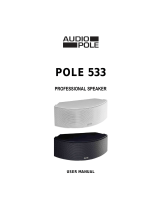3
When Installing the Unit
• Install the unit only in a location that can
structurally support the weight of the unit and the
mounting bracket. Doing otherwise may result in
the unit falling down and causing personal injury
and/or property damage.
• Do not use other methods than specified to mount
the bracket. Extreme force is applied to the unit
and the unit could fall off, possibly resulting in
personal injuries.
• Use nuts and bolts that are appropriate for the
ceiling's or wall's structure and composition. Failure
to do so may cause the speaker to fall, resulting in
material damage and possible personal injury.
• Tighten each nut and bolt securely. Ensure that the
bracket has no loose joints after installation to
prevent accidents that could result in personal
injury.
• Do not mount the unit in locations exposed to
constant vibration. The mounting bracket can be
damaged by excessive vibration, potentially
causing the unit to fall, which could result in
personal injury.
• (F-2000B, F-2000BT, F-2000W, F-2000WT only)
Since the unit is designed for in-door use, do not
install it outdoors. If installed outdoors, the aging of
parts causes the unit to fall off, resulting in personal
injury. Also, when it gets wet with rain, there is a
danger of electric shock.
• (F-2000BTWP, F-2000WTWP only)
When installing the unit in the snowy area, take
appropriate measures to prevent snow from lying
on the unit. If the snow lies on the unit, the unit may
fall, causing personal injuries.
• Do not use anti-rust lubricant. If it contacts resin or
rubber parts, they could deteriorate and cause the
unit to fall, possibly resulting in personal injury.
• Avoid installing the speaker in locations close to
the seashore or in indoor swimming facilities that
are not well ventilated. In such locations the
bracket may be vulnerable to corrosion, eventually
allowing the speaker to fall resulting in personal
injury.
When Installing the Unit
• Avoid touching the unit's sharp metal edge to
prevent injury.
• To avoid electric shocks, be sure to switch off the
unit's power when connecting speakers.
When the Unit is in Use
• Do not place heavy objects on the unit as this may
cause it to fall or break which may result in
personal injury and/or property damage. In
addition, the object itself may fall off and cause
injury and/or damage.
• Do not operate the unit for an extended period of
time with the sound distorting. This is an indication
of a malfunction, which in turn can cause heat to
generate and result in a fire.
• Do not stand or sit on, nor hang down from the unit
as this may cause it to fall down or drop, resulting
in personal injury and/or property damage.
• Have the unit checked periodically by the shop
from where it was purchased. Failure to do so may
result in corrosion or damage to the unit or its
mounting bracket that could cause the unit to fall,
possibly causing personal injury.
1. SAFETY PRECAUTIONS
• Before installation or use, be sure to carefully read all the instructions in this section for correct and safe
operation.
• Be sure to follow all the precautionary instructions in this section, which contain important warnings and/or
cautions regarding safety.
• After reading, keep this manual handy for future reference.
Safety Symbol and Message Conventions
Safety symbols and messages described below are used in this manual to prevent bodily injury and property
damage which could result from mishandling. Before operating your product, read this manual first and
understand the safety symbols and messages so you are thoroughly aware of the potential safety hazards.
Indicates a potentially hazardous situation which,
if mishandled, could result in death or serious
personal injury.
WARNING
Indicates a potentially hazardous situation which,
if mishandled, could result in moderate or minor
personal injury, and/or property damage.
CAUTION




















